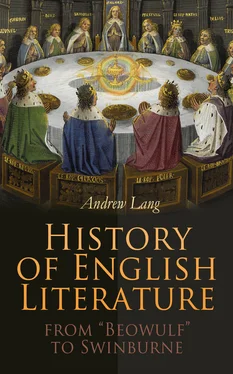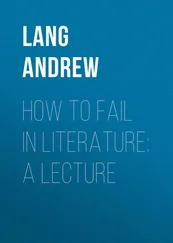In this poem, as in "Beowulf," the sea is spoken of as it would be by men who knew its wild moods; cold, tempest, biting salt water, danger, and grey waves under driving rain, yet the seafarer loves, it. The poet says that (like
The gentlemen of England
Who live at home at ease,)
many a one knows not the dangers of the deep, while the minstrel has heard the swan sing through the ice-cold showers of hail and the spindrift. But the coming of spring and the cuckoo's cry, admonish the brave man to go seafaring, despite the distresses; they are more inspiriting than life on land. He is a Christian, but he falls back on the old melancholy for the passing of kings and gold-givers. Though he preaches over much, he still thinks of the bale-fire as the mode of burial, as if Christian rites of earth to earth were not yet adopted.
Of this poem only some sixty lines exist. They were found at Copenhagen, written on two pieces of vellum which had been used in binding a book: it is common to find fragments of early printed books or manuscripts in the bindings of books more recent. One page of "Waldhere" contains a speech by the heroine of the tale, Hildeguthe, urging Waldhere to fight Guthere; the other fragment has portions of a dialogue between the two combatants.
The names of the personages show that the poem was one of which we have other versions, the most intelligible is a Latin form in verse. 4The story deals with an adventure, real or romantic, in the wars of Attila with the Franks. Waldhere, an Aquitanian hostage, brought up in Attila's court, with his betrothed lady, Hildeguthe, daughter of the King of the Burgundians, is now keeper of Attila's treasures; he and his friend Hagen escape; Hagen, who first fled, reached the court of Guthere, King of the Franks, and hearing there that a lady and a knight, with a treasure, are wandering about, he recognizes his friends, and follows them with King Guthere (who mainly wants the treasure), and with eleven other warriors. Hildeguthe sees them coming, and Waldhere, who will not give up the treasures, slays the eleven companions of Guthere, who are chivalrous enough to "set him man for man," as the Scottish ballad says, in place of overpowering him by numbers. Hagen, of course, does not want to fight his friend Waldhere, but Fate, the Anglo-Saxon Wyrd , is too strong: Waldhere has to encounter both Guthere and Hagen, for Hagen is Guthere's man, or thegn, and may not disobey him; moreover, he must avenge his nephew, whom Waldhere has already slain. All three men receive terrible wounds, and then they make friends; and Waldhere keeps both his lady and the treasure.
This version of the story is more like a later romance than the other Germanic epics. In these, as in this tale, there is usually a tragic conflict of passions and duties, as when the law of blood-vengeance compels a woman to avenge a slain father or brother, or her husband or her lover. The end is always tragic, but the Latin poet has probably contrived "a happy ending," while retaining the many good fights, and the conflict of friendship and duty to a hero's lord, which make the interest of the story.
In the Anglo-Saxon fragments, Hildeguthe, encouraging, her lover to fight, praises the swordsmith, the old German hero, Weland, the Tubal Cain of the race. He made the sword Miming, the best of all swords, which never fails the fighter. Hildeguthe has never seen Waldhere flee the fight; now he must not be less noble than himself. The other fragment is like the dialogues of the heroes in the Iliad before they come to blows.
The whole of "Waldhere" must have been, when complete, a poem much more complex, and even more interesting (at least to modern readers) than "Beowulf". It had "love interest," a brave heroine, good duels, and the tragic conflict of duties, while it was full of allusions to other ancient epics of the Germanic peoples.
In a song of the gleeman at Hrothgar's house in "Beowulf," there are obscure references to the slaying of Hnæf, brother of Hildeburh, wife of the Frisian King Finn, and the slaying of Hildeburh's own sons by the men of Hnæf, in a fight within the royal hall of Finn. They are all burned together on the funeral pyre, while Hildeburh weeps for sons and brother. A fragment of an Anglo-Saxon epic on this affair exists only in one copy, the original is lost. It is a complicated story of slayings and revenges among folk akin by marriage, and the interest clearly lay in the tragic situation of Hildeburh, who owes vengeance against her husband, Finn, and also against the family of her brother, who have slain her sons. As Hildeburh returns to her own people, the Danes, after her husband is killed, she probably preferred her own blood kindred to those of her husband.
1.The best versions for English readers of these splendid stories are to be found in "The Volsungs and the Niblungs," translated by William Morris and Magnusson, and in "The Corpus Poeticum Boreale," with translations by F. York Powell and Vigfusson.
2.This form of verse has been described thus by Prof. Saintsbury:—
"The staple line of this verse consists of two halves or sections, each containing two 'long,' 'strong,' 'stressed,' 'accented' syllables, these same syllables being, to the extent of three out of the four, alliterated. At the first casting of the eye on a page of Anglo-Saxon poetry no common resemblance except these seem to emerge, but we see on some pages an altogether extraordinary difference in the lengths of the lines, or, in other words, of the number of 'short,' 'weak,' 'unstressed,' 'unaccented' syllables, which are allowed to group themselves round the pivots or posts of the rhythm, that is, round the syllables on which strong stress is laid."
The eye and ear of the reader soon find out the essential facts of the measures; the strong pause in the middle of each verse, the alliteration, the accent, and the great variety in the number of the syllables which are slurred, or not dwelt upon, in each case. The poetry avoids rhymes, except in "The Rhyming Poem," later than King Alfred's time, and in two or three Other instances.
3.The words are:—
Ic me mid Hruntinge
dóm gewyrce, otthe mec death nimeth.
I (Ic, German Ich ) with (German mit ) Hrunting , glory will win, otherwise ( otthe ) me ( mec ) death taketh ( nimmeth ), German nehmen ("to take").
4.Translated from a lost German form; the Latin is of the tenth century, by Ekkehard of St. Gall.
CHAPTER II.
ANGLO-SAXON CHRISTIAN POETRY.
Table of Contents
When the Anglo-Saxons became Christians (597-655) they took the Gospel, and the rules of the Church, in the North, from the Irish missionaries who, under St. Columba of Ireland, settled in the Isle of Iona: in the South from Roman teachers, such as Theodore of Tarsus, who had studied at Athens, and, in 668 became Archbishop of Canterbury. Both in the South, and North, in Northumberland, great schools were established, in connexion with the monkish settlements: in the monasteries Greek was not unknown, and the language of Rome, Latin, was taught and was used in writing all learned works, and hymns. With the language of Rome, almost dead as a living speech, came knowledge of ancient history, and of the great Roman poets, especially Virgil. The seventh and eighth centuries were thus a new epoch, a century of learning, and of division between the educated and the unlearned. The learned, mainly priests, no longer cared much for making songs and stories about fighting, love, and the adventures of their heathen heroes. They were occupied with the history of Rome and of the old world; and still more with their new religion, and the stories of apostles and saints and Hebrew kings and patriarchs, and with the making of sermons and hymns. Thus the old heathen tales and poems were lost or half forgotten.
Читать дальше












